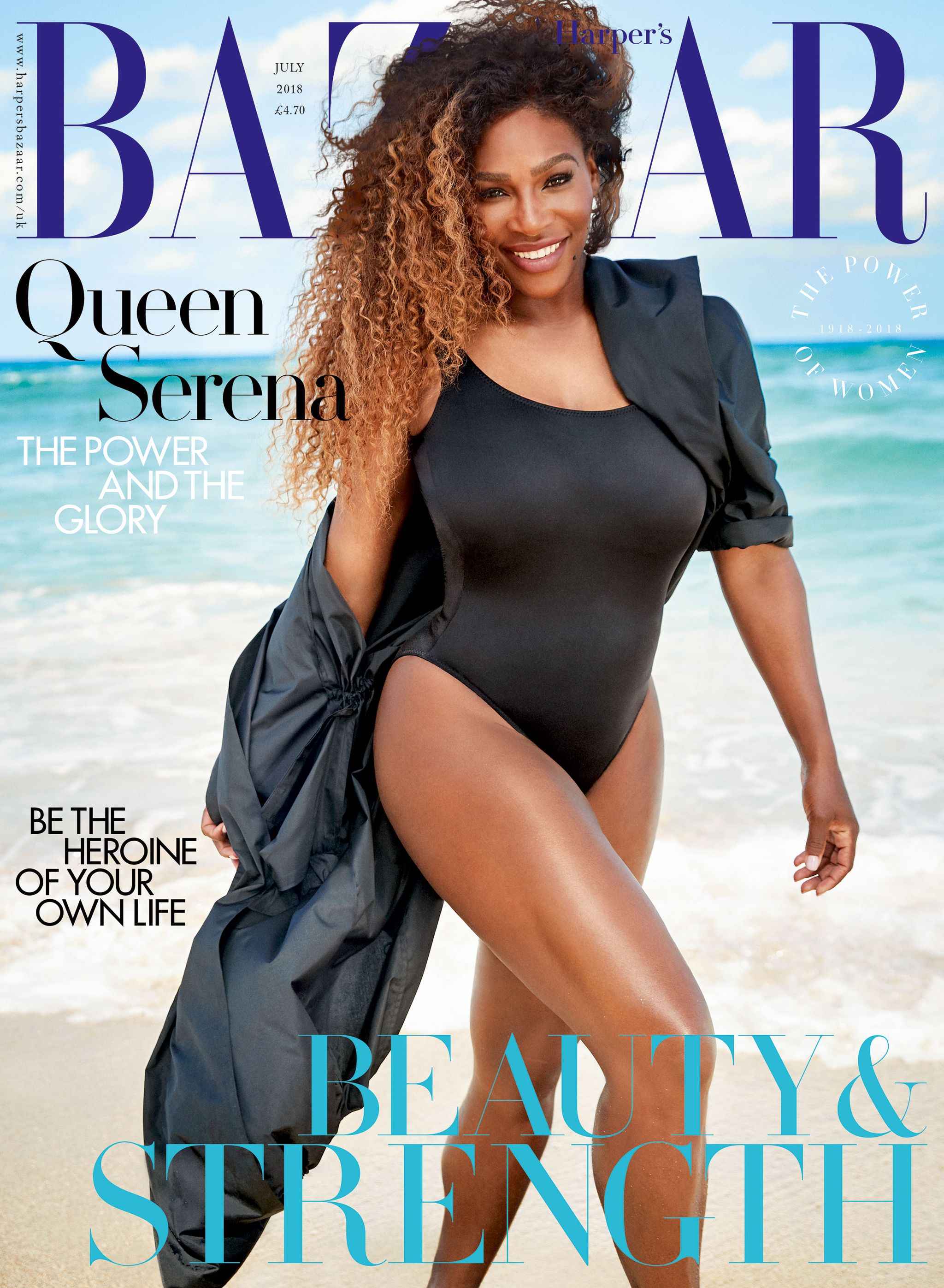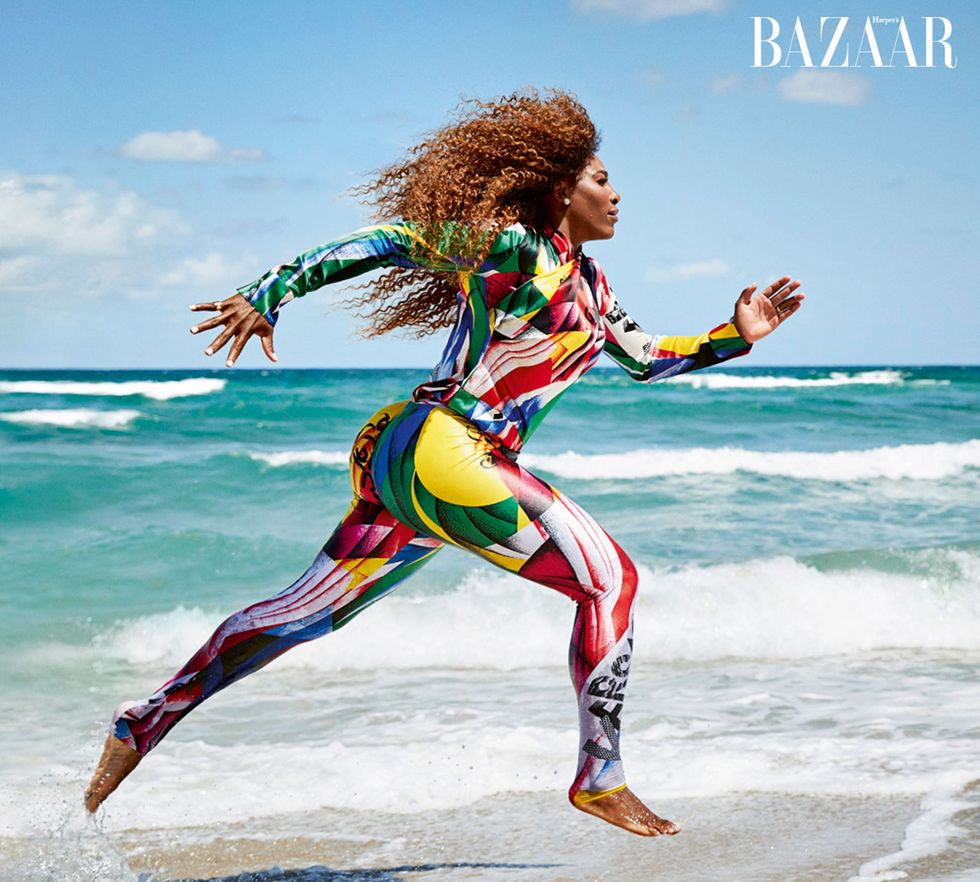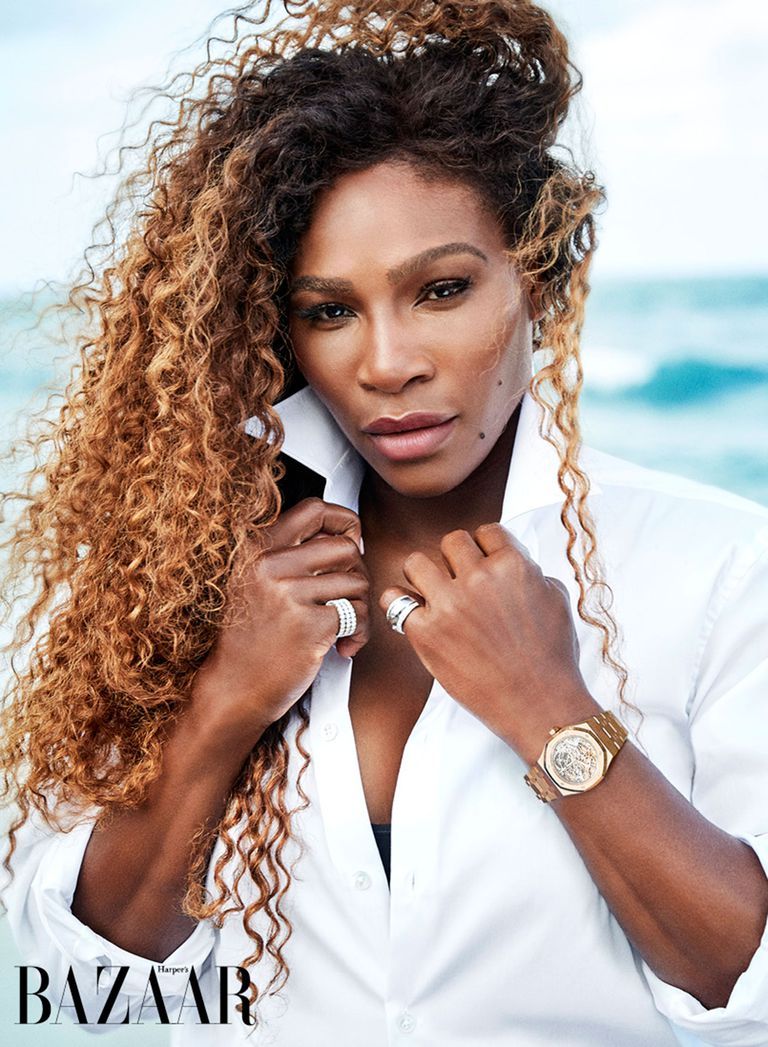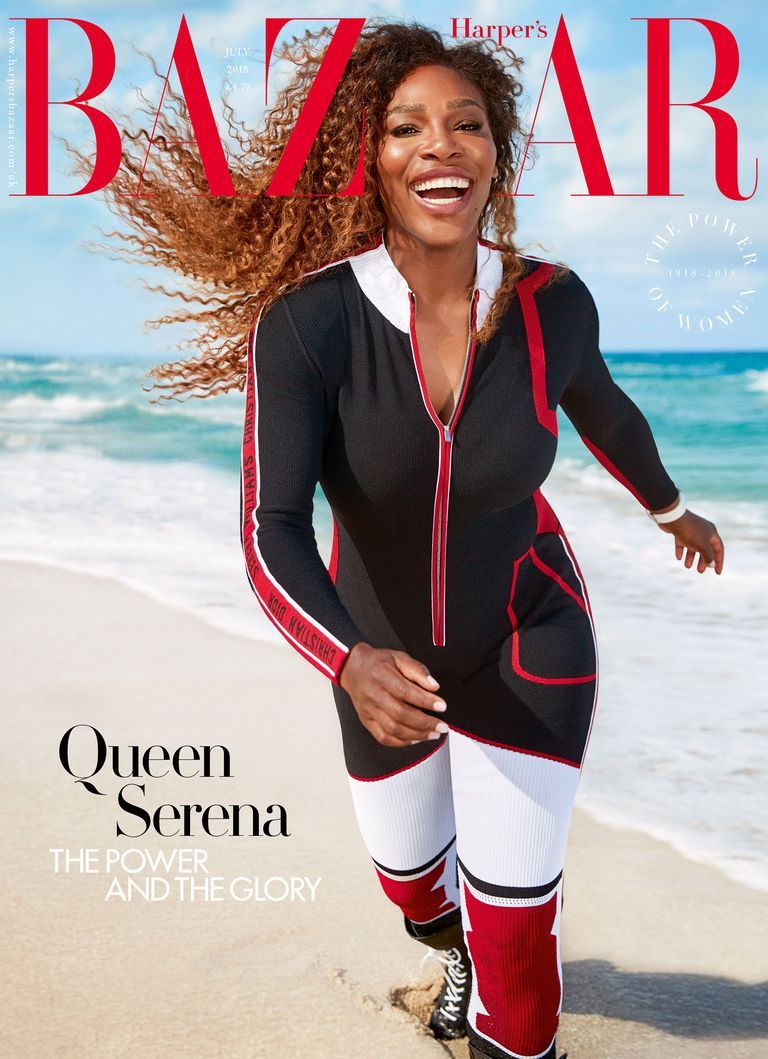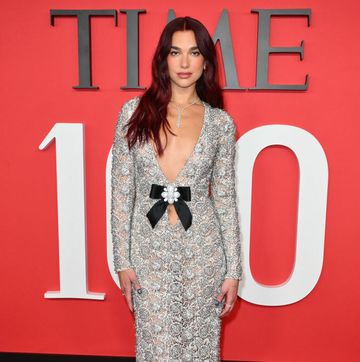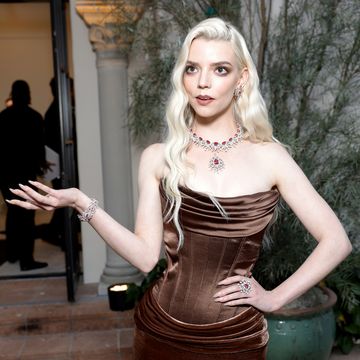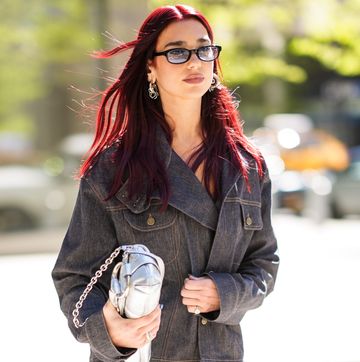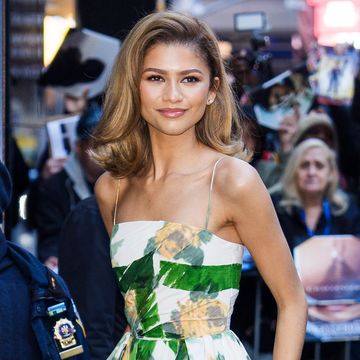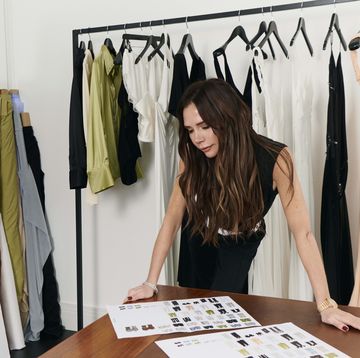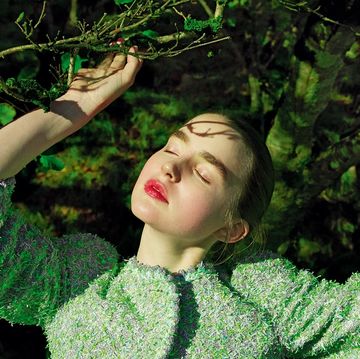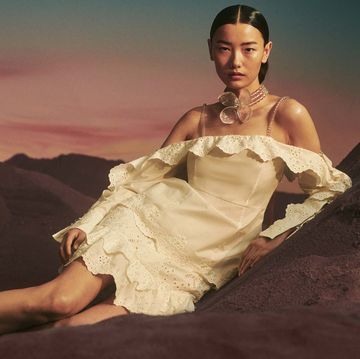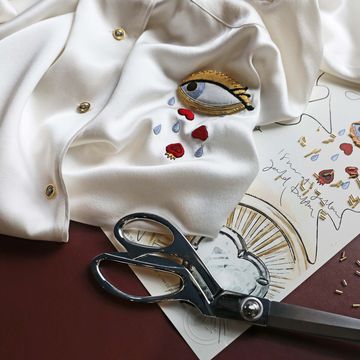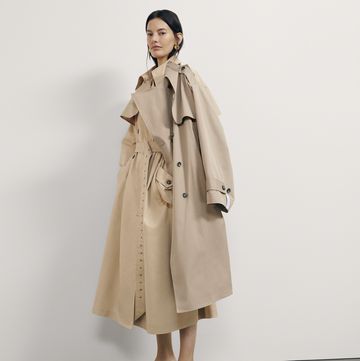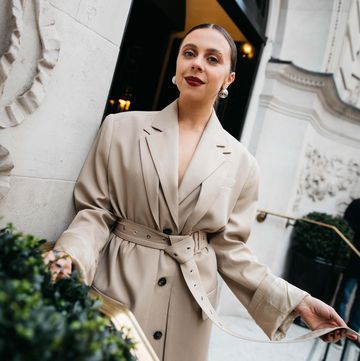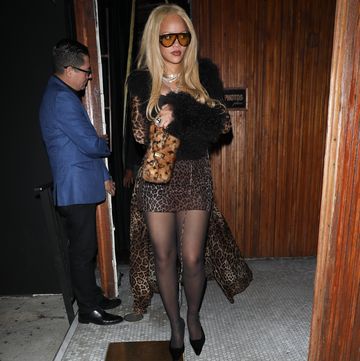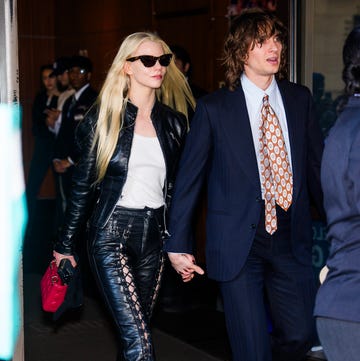As one of the greatest athletes of all time, Serena Williams has overcome misogyny and racism with inspirational fortitude and grace. Now that she is combining her return to Wimbledon with life as a new mother, after a traumatic birth that nearly killed her, she talks to Lydia Slater about sisterhood, self-acceptance and staying strong.
Smacking aces across Centre Court, Serena Williams impresses even on a TV screen. In the flesh, her physical presence is almost overwhelming. Standing 5’9” in her trainers and wearing a knotted turban on her head that adds another three inches, she towers above me. Her hair is swept away from her face, which, bare of make-up, reveals a heavy-lidded, Nefertiti-esque beauty. Skin-tight black leggings and a fishnet tee cling to her muscled frame, and over her broad shoulders she has slung an army camouflage jacket, graffitied in fuchsia pink with the legend 'Queen. Don't be afraid to rule like a king.'
The overall impression is one of awe-inspiring femininity, like having an audience with the Greek goddess Hera, or perhaps a lioness. What it must be like to face Serena across the net, I can scarcely begin to imagine.
Her dominance over tennis in the past two decades has seen her hailed as the greatest player ever. Four times an Olympic gold medallist, she holds the record for the most Grand Slam titles in singles, doubles and mixed doubles combined, and carried off the 2017 Australian Open title while pregnant, without dropping a set. Now, though she’s still breastfeeding little Alexis Olympia (who at the time of our meeting is seven months old), Serena is in training for Roland-Garros and Wimbledon. Her aim is to beat Margaret Court’s all-time record of 24 Grand Slam singles titles, won between 1960 and 1973. ‘But why limit myself to 25? ’ Serena muses.
Well, perhaps because only three players – Court, Evonne Goolagong and Kim Clijster – have ever won major titles after giving birth, and they were younger than Serena, who is now 36. (Indeed, when she triumphed at Wimbledon in 2015, at the age of 33, she was already the oldest woman in the Open era to secure a Grand Slam singles title.) But such facts don’t daunt Serena, they inspire her. ‘I love making history,’ she says, calmly. ‘This gives me another opportunity.’
Yet making history is not enough. The day after our meeting, Serena will unveil her eponymous fashion collection of women’s athleisure with attitude, featuring T-shirts emblazoned with her signature S and empowering slogans: sophisticated, strong, smart, stylish, silly, sexy, super...
Then there’s a new HBO series, Being Serena, a fly-on-the-wall documentary that follows her during possibly the most tumultuous year of her life, in which she has given birth, nearly died and got married to Alexis Ohanian, the co-founder of the site Reddit, in a celebrity-fuelled ceremony attended by Beyoncé, Jay-Z and Kim Kardashian, among others. (The bride wore Nikes beneath her Alexander McQueen gown: ‘I like to be practical.’)
And then there are Serena’s various philanthropic initiatives, such as the venture-capital company she has started, to invest in female-led businesses. ‘Just helping them get their foot in the door. That’s been really exciting.’
Fitting in all these demands on her time requires a good degree of multi-tasking, which is why we have met for our interview in an otherwise deserted New York hotel spa, so she can get a pedicure at the same time. Serena stretches out on a towel in the elevated chair and I sit humbly at her feet, while the therapist paints her toes baby pink. Pink is her favourite colour. ‘I’m the most girlie out of all the sisters,’ she tells me with a soft chuckle. Indeed, the youngest of the five daughters born to Oracene Price has an intense femininity that makes the body-shaming and misogynist abuse with which she has been beset seem bizarre. The internet crawls with websites insisting that she was born male, and in 2014 the head of the Russian Tennis Federation, Shamil Tarpischev, was suspended for a year by the WTA and fined $25,000 for referring to Serena and her elder sister and fellow tennis champion Venus as the ‘Williams brothers’ and saying, ‘It’s scary when you really look at them.'
‘It was hard for me,’ says Serena understatedly. ‘People would say I was born a guy, all because of my arms, or because I’m strong. I was different to Venus: she was thin and tall and beautiful, and I am strong and muscular – and beautiful, but, you know, it was just totally different.’Although early on in her career she sensibly resolved never to read anything that was written about her, she was unable completely to withstand the societal pressure to shrink: one journalist noted in 2004 that in a list of goals the then-22-year-old Serena had written for herself, beneath winning the Italian and French Opens and Wimbledon, she had listed getting down to a size 4
‘Oh God, I’ll never be a size 4! Why would I want to do that, and be that? ’ she marvels. ‘This is me, and this is my weapon and machine,’ she says, gesturing towards her bicep. ‘But I love that I said that, because I can understand. I can show Olympia that I struggled, but now I’m happy with who I am and what I am and what I look like... Olympia was born and she had my arms, and instead of being sad and fearful about what people would say about her, I was just so happy.’
Serena is frankly thrilled to have a daughter. ‘I knew I was having a girl, because when I was playing tennis in the [Australian Open] tournament, I didn’t have one day of morning sickness, no symptoms. Australia is really hot, some days can be over 40 degrees, which is insane, but she never complained. I said to Alexis, “This is a girl. Only a woman can be this strong.'
I had wondered if as an athlete Serena would have found it traumatic to watch her body changing shape, softening, out of her control; but she says she loved being pregnant. ‘If I wasn’t playing tennis, I’d be pregnant right now – sorry, I’m one of those women,’ she says, laughing. ‘I’ve been injured so many times, and played on it, my body is used to adjusting.’ But the birth itself – partly captured on-screen in the HBO series – was a different story. ‘I knew I wasn’t going to be able to have her naturally, it was like this intuition. I just kept thinking, “There is no way it’s going to happen”, and it didn’t.’
First, the baby became distressed and had to be delivered by emergency C-section; then Serena developed blood clots in her lungs post-operatively, causing her to cough so much she ruptured her caesarean scar and her stomach filled with blood. This cascade of complications necessitated repeated surgery, including the implantation of a filter to prevent pulmonary embolisms migrating to her lungs, followed by weeks of bed rest. ‘What I went through was awful. Looking back, I don’t know how I got through it all. I mean I was praying, I know my mom was praying a lot.'
In February, Serena wrote an op-ed piece for CNN about her traumatic experience, urging readers to donate to Unicef to improve maternal and infant mortality rates. ‘I am very fortunate that I am who I am, and also my doctor was very highly recommended, and she listened to me. Most doctors don’t do that, and people are dying, women of colour in particular. The numbers are insane,’ she says. Unsurprisingly, after her ordeal, she suffered from post-partum depression. ‘Honestly, sometimes I still think I have to deal with it,’ she confesses. ‘I think people need to talk about it more because it’s almost like the fourth trimester, it’s part of the pregnancy. I remember one day, I couldn’t find Olympia’s bottle and I got so upset I started crying... because I wanted to be perfect for her.’ Does she feel she’s a good mother? ‘I do,’ she says, almost shyly. ‘I hope I am, and I’m going to strive to be the best mom I can be.’
Although Serena hopes to instil her parents’ values of determination, obedience and religious belief, Olympia’s upbringing will be unimaginably different from her own. Serena, after all, grew up in the notorious Compton area of LA, where the public tennis courts were scattered with used syringes, and her father Richard, who was also her coach, reputedly used to pay local children to hurl racist abuse at her while she was playing, so she would get accustomed to it.
Although Serena has installed the Australian Open cup on Olympia’s bedroom wall – ‘I couldn’t have done it without her, it’s her win’ – she has no intention of pushing her into the same profession. ‘I don’t know any player who would say they want their kid
to play tennis,’ she says; for she has had to give up so much for it.
‘Outside of the Mandarin tutor and the French tutor, which I’m really serious about, and of course ballet, I have no dreams for her,’ she says, laughing. ‘I want to let her do whatever she wants to do, as long as it’s positive. Always try to be an addition to society, not a subtraction.’
Of course she would love Olympia to have a sister. ‘I told Alexis, I hope it’s another girl. Olympia needs a little sister, and then we can have a boy. I’ve only been around girls my whole life.’
Oracene had three daughters from her first marriage, Yetunde, Lyndrea and Isha; Venus and Serena were born from her subsequent union with Richard Williams. Although Serena is close to all her remaining siblings (Yetunde was tragically shot, an accidental victim of gang warfare, in 2003), it is her relationship with Venus that fascinates. Serena says Venus was ‘literally the best role model’ growing up, and as adults, they chose to live together. Yet they are simultaneously each other’s greatest rivals on the tennis circuit. Both have been ranked World No 1 – Venus got there first – and so far, they have confronted each other 29 times in professional tournaments, with Serena winning the majority of their duels. Serena beat her elder sister to carry off that Australian Open cup, her last match before taking maternity leave; and Venus put paid to her little sister’s singles comeback in Indian Wells this March.
In this, as in so much, Serena appears to rise almost effortlessly above pressure that would destroy a lesser mortal. ‘I want [Venus] to win every time she’s playing, except when she’s playing me. And when she’s playing me, I want her to win, but I want to win – and I feel awful if I win. It’s this incredible fight inside of myself.’
Her coping strategy is to refuse to look her sister in the eye. ‘I have to pretend she’s someone else,’ she says. ‘I always tell myself, in 10 years, none of this is going to matter, we’ll still be sisters and she’s not going to be upset with me for beating her in this particular tournament.’
‘It’s hard, but we’ve both been there since before I can remember. My dad said we’d be playing each other in the Wimbledon finals, we’d play each other in the US Open finals, so in a weird way, we were kind of prepared for it.’
Another prediction from her formidable parent was that his daughters could aim to
retire at the age of 23 or 24. Serena has no intention of obeying this dictum at least. ‘It’s not time yet,’ she says crisply. ‘I’ll know when it is.’But she admits that tennis is no longer as important to her as it was before Olympia’s birth. ‘It’s definitely family before tennis for me,’ she says. ‘When I’m training, I have to be done at 1pm, because I’ve got to be with Olympia. I haven’t gone a day without seeing her.’
The baby will of course be accompanying her to Wimbledon, though Serena plans to have stopped breastfeeding by then. ‘If I’m in the locker-room pumping before my match, that’s crazy!’ But does she honestly feel she could defy the statistics and reclaim that iconic silver salver? Serena leans forward off the massage bed and whispers into my ear. ‘Yes!’ she hisses.
‘I’m not going to play if I don’t think that. Even if my goals are outrageous, totally insane, I’d rather reach for the sky.’ Spoken like the true goddess she is.
The July issue of Harper's Bazaar is out now.
